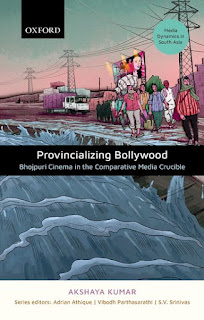
He applied the “Page 99 Test” to his new book, Provincializing Bollywood: Bhojpuri Cinema in the Comparative Media Crucible, and reported the following:
Page 99 of Provincializing Bollywood discusses the emergence of Bhojpuri action-melodramas, which “altered the visual language of Bhojpuri films.” The chapter to which the page belongs focuses on the pre-eminent material cache – Bhojpuri cinema – which is elaborated and periodized for a thorough cultural analysis. On page 99, we foreground the process of privileging individual desire and the recession of the visual motifs of community life, which prepares the ground for the fantasy of traditional rural life and robust masculinity. We also learn about the visual routines by which this brooding masculinity is appeased by the “amorous offerings of the female counterpart,” who mediates the “intersecting worlds of private desire and public decency”. The politics of sexual difference, then, ensures that “violence becomes, as a result, a bounden duty, a moral bandwidth, a barometer for the capacity to feel outraged and defend one’s territory.”Follow Akshaya Kumar on Twitter.
While page 99 may not represent the book’s compound structure, it still suitably lands the browsers at a convenient entry-point into the core cultural process by which Bhojpuri cinema acquires its libidinal appetite. Quirky as the method may be, the page 99 test appears to be a partial success.
Provincializing Bollywood situates Bhojpuri cinema within the comparative media crucible, performing an analytical equivalent of extractive metallurgy, to identify the substances, processes and the vessel which have incubated the libidinal intensity of Bhojpuri popular culture. It argues that the scandalously out-of-turn and desperately out-of-tune libidinal belligerence of Bhojpuri media revels in the violation of an imagined language of command, which effectively challenges the poor social intelligence of control systems, all the while joyriding on the newly laid asphalt of digital media. In doing so, the book rehabilitates the research object of classical film studies in the new media ecology, particularly at the low-budget end.
--Marshal Zeringue



